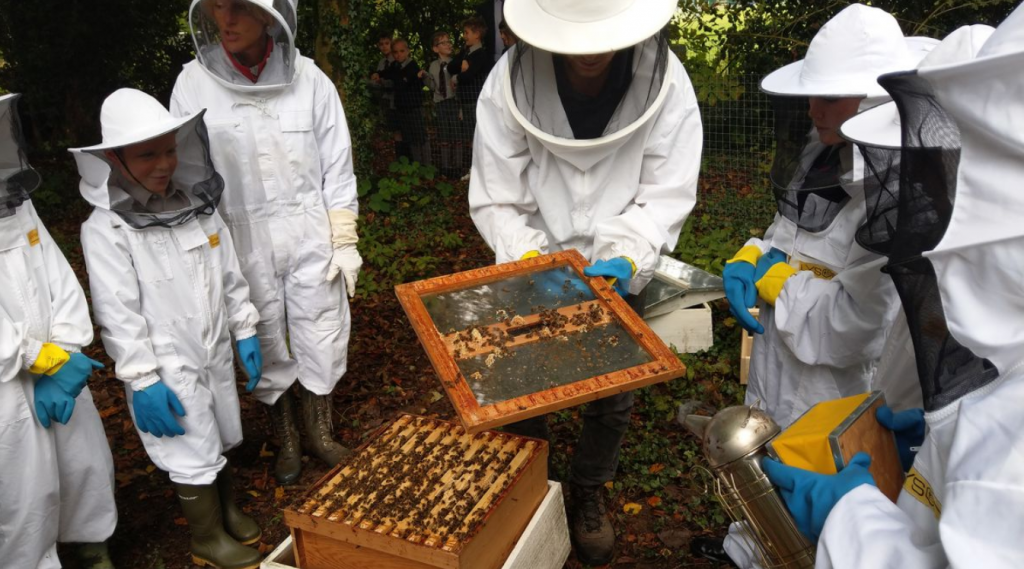A team of academics from Kingston University including Dr Rosa Busquets, Dr Olga Duran and Dr Gordon Hunter, are working with Mark Gale, of not-for-profit company BeesMax and Surrey Honey Farm, on the development of new devices for monitoring pollutants within honeybee hives through funding from the BIG South London Voucher Scheme. At the start of this year’s EU Pollinator Week, they outline why the decline in honeybee populations is a global problem and how these technologies could help better understand the impact pollution is having.
For several decades now bee populations have been in serious decline across Europe and North America. The majority of our flowering plants, including many that produce crops for human consumption, rely on bees and other insects for pollination. Honeybees and other bee species are particularly important to our agricultural sector and the produce that eventually ends up on our supermarket shelves. Much of this worrying decrease in numbers has been widely attributed to the use of pesticides, fungicides, and other pollutants in our environment.
Honeybees have been found to inadvertently collect pollutant molecules on their bodies while foraging for nectar, which then make their way back into the beehive and effect the efficiency of the colony. However, understanding the exact levels of these pollutants within hives and the precise effect each may be having is much harder to determine.
 Through the project the team is hoping to better understand the impact pollution is having on bees within the hive, To help address this issue, beekeepers from honeybee conservation group BeesMax and Surrey Honey Farm applied for funding through the BIG South London Innovation voucher scheme to access the support and research expertise of academics from Kingston University’s Faculty of Science, Engineering and Computing.
Through the project the team is hoping to better understand the impact pollution is having on bees within the hive, To help address this issue, beekeepers from honeybee conservation group BeesMax and Surrey Honey Farm applied for funding through the BIG South London Innovation voucher scheme to access the support and research expertise of academics from Kingston University’s Faculty of Science, Engineering and Computing.
Through this project we will be working together to investigate the scale of the problems affecting bees in the local area, with the academic team developing new ways for the beekeepers to monitor pollutants within their hives, which we hope will lead to a better understanding of which chemicals might be affecting their ability to thrive and how that could be addressed.
Why did BeesMax want to work with Kingston University?
As a not-for-profit company with the sole aim of reversing the decline of the UK bee population, bringing together our knowledge and experience as beekeepers with the scientific expertise of university researchers provides a unique opportunity to explore new ways of potentially reversing the dwindling numbers in bee colonies. It will hopefully allow us to better understand one of the major problems bees face in a way which we, ourselves, haven’t been able to monitor before and lead to further research going forward.
Bees may be small but they play a vital role in pollinating the food we need to survive. Just as societies around the world are working out what the human race’s ‘new normal’ looks like after the Covid-19 pandemic, we are aiming to address and reverse a decline that has sadly become normal for the bee population as well.
What expertise is Kingston University providing?
The Kingston University team working with BeesMax and Surrey Honey Farm is made up of Associate Professor in analytical chemistry Dr Rosa Busquets, Senior Lecturer in mechanical engineering Dr Olga Duran and Associate Professor in mathematics and computing Dr Gordon Hunter. Together we have been working on research relating to the monitoring of honeybees for a number of years.
This has covered the monitoring of harmful pollutants, including neonicotinoids – which are particularly toxic for bees. Alongside this, we have been applying mathematical, statistical and artificial intelligence methods to gather information through signals from various types of devices monitoring the activities of pollinating insects, especially bees. This should improve our understanding of the lifecycle of bees and other insects and help identify problems occurring within beehives.
This work has been supported by several companies, funders such as Innovate UK and other research partners.
Through this partnership with BeesMax we will develop a new approach for detecting the presence of toxic substances to bees in beehives, with the information being collected in a non-invasive manner from bees moving around within the hive, guided by the experience of the company’s beekeepers.
Next steps
A key element of this work will be to establish how effective this type of chemical monitoring could be through a proof-of-concept pilot study. If successful, the team will seek further support to study the extent of the problem in a wider area and continue to develop the technology.
For BeesMax, the hope is this work could lead to the development of low-cost products that could be used by hobbyist beekeepers, commercial honey farms and the natural beekeeping community to test feral bees living in trees – helping people around the globe to monitor and better understand the impact of environmental pollutants on bees and which chemical substances may be causing issues within hives.




